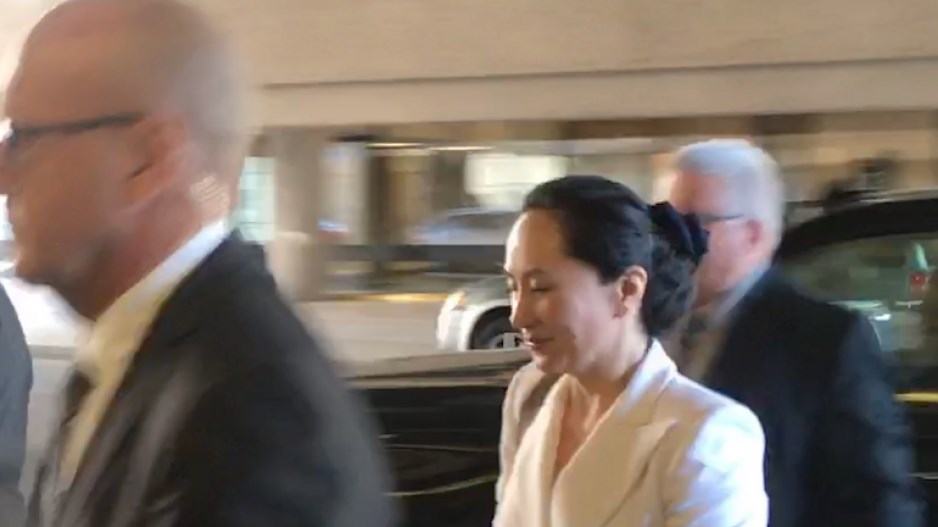The extradition hearings for Huawei Technologies Co. Ltd. CFO Meng Wanzhou resumed today, and the debate has centred on what evidence can or cannot be introduced on the issue of an alleged U.S.-Canadian conspiracy to detain the Chinese tech executive for three hours without formally making an arrest.
Meng’s defence lawyers have requested a wide range of documents from Canadian authorities (the RCMP and the Canada Border Services Agency), as well as U.S. justice officials, regarding their coordination prior to Meng’s arrest on Dec. 1, 2018, in Vancouver.
Crown lawyers have provided some of the requested information, but also added that certain information is privileged and should not be released. Doing so, they argue, will put the U.S.-Canada investigation and law-enforcement mechanisms at risk.
However, defence lawyer Scott Fenton argued that the Crown had already expressed waived the protection of solicitor-client privilege in keeping some documents on the day-of-arrest undisclosed. Fenton noted that last year in court Crown attorney Robert Frater noted the disclosure of a letter on Dec. 1, 2018 from Crown lawyer John Gibbs-Carsley to RCMP constable Winston Yap as "a privileged document generously disclosed in proceedings," meaning the Crown has already met the two conditions of an expressed waiver: Acknowledgement of the privilege and action/intent to waive it.
"It’s our respectful submission that you have a very strong record before you of the classic expressed waiver," Fenton told the court this morning. "You have clear evidence of knowledge of the existence of privilege… and purposeful conduct or intention to waive that privilege. There’s no evidence whatsoever of inadvertent disclosure."
Fenton noted that case precedents said that - once an expressed waiver is in place - any documents on the same subject matter as the document covered by the waiver are now under the effect of the waiver as well (and should be disclosed). Fenton argued that it means any communications between the Attorney General's Office and the RCMP on that day in regards to Meng's arrest - same as Gibbs-Carsley's letter to Yap - should also now be fair-game for the court to consider as evidence.
"If the Attorney General of Canada were given updates that she [Meng] has not been immediately arrested, that is relevant - in our respectful submission - to the abuse-of-process allegations... and should follow into that waiver," Fenton said.
Crown counsel, in its response in the afternoon, said while it agrees with the defense on the law of privilege waivers, the application as proposed by the defense is problematic. Crown prosecutors noted that solicitor-client privilege for government lawyers and the agencies they serve (i.e. the RCMP) should be no different than that of private lawyers and their clients - a relationship that is very difficult to de-privilege.
Given that the stream of communication between the Attorney General's Office and the RCMP on Dec. 1, 2018 all consists of legal advice within the parameters of privilege protection, the documents - as a whole - should not be disclosed, crown counsel argued. To separate parts of the communications out for disclosure is also difficult, prosecutors argued, as the Meng's innocence is not dependent on the documents in question being released, and there's no danger to public safety in maintaining privilege.
The hearings rest of the week are not currently open to the public, although that is subject to change. Meanwhile, Meng's next court appearance - in-person - will be Sept. 28.
According to Meng's lawyers this morning, 37 documents remain "at issue" in terms of U.S./Canadian authorities' disclosure of the facts surrounding Meng's arrest. A number of the documents were redacted in a fashion that, defence lawyers said, may be "strategic" in nature, and Meng's team is requesting the court to rule on these documents' full release for court's use.
The court also heard that the Attorney General of Canada initially responded with as many as 93,000 documents in response Meng's request for more documents surround the 2018 arrest. That number was eventually reduced to 358 - some redacted, others with details withheld completely. It is from these 358 that the current 37 documents "at-issue" have been produced, defense lawyers said.
As many as 17 of the documents being disputed, Meng lawyers noted, are "solely litigation-privileged" - or kept undisclosed because they are produced for an existing or anticipated lawsuit. Meng's team, however, is arguing than an exception may apply in the current situation of an alleged abuse-of-process by authorities arresting the Huawei executive.
Last month, Meng’s defence team made claims in documents filed in federal court that statements by U.S. President Donald Trump about using Meng as a trade-chip in negotiations with China over bilateral agreements indicate a high-level political motive on the part of U.S. authorities in making the extradition request. Complying with the extradition request, the defence argued, would poison the Canadian judicial system.
The Crown has remained adamant that the arrest of Meng is about the Huawei executive’s alleged criminal activities under U.S. law, such as committing fraud and money laundering through the U.S. banking system while using a subsidiary to do business in Iran - in contravention to U.S. sanctions at the time. Huawei is also alleged to have stolen trade secrets from companies such as T-Mobile USA in the United States.
Earlier this year, presiding judge (and B.C. Supreme Court associate chief justice) Heather Holmes dealt the Meng defense the first major blow in the case, dismissing the defense claim that the Crown failed to achieve double-criminality (in that Meng’s alleged crimes in the U.S. do not amount to an arrestable offense in Canada).
The case, which is scheduled to conclude next spring, will now centre on the topic of abuse of process - or U.S./Canadian authorities improperly using extradition to achieve an ulterior, political motive. The privilege debate will form the first part of that discussion.




